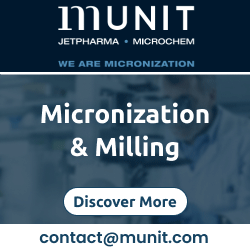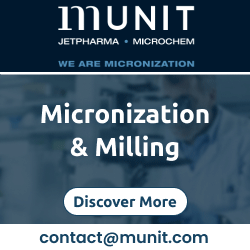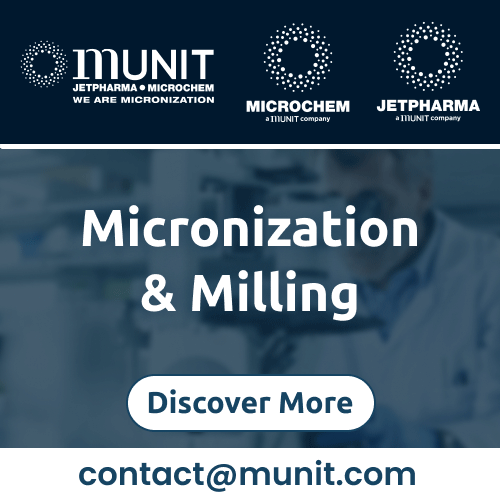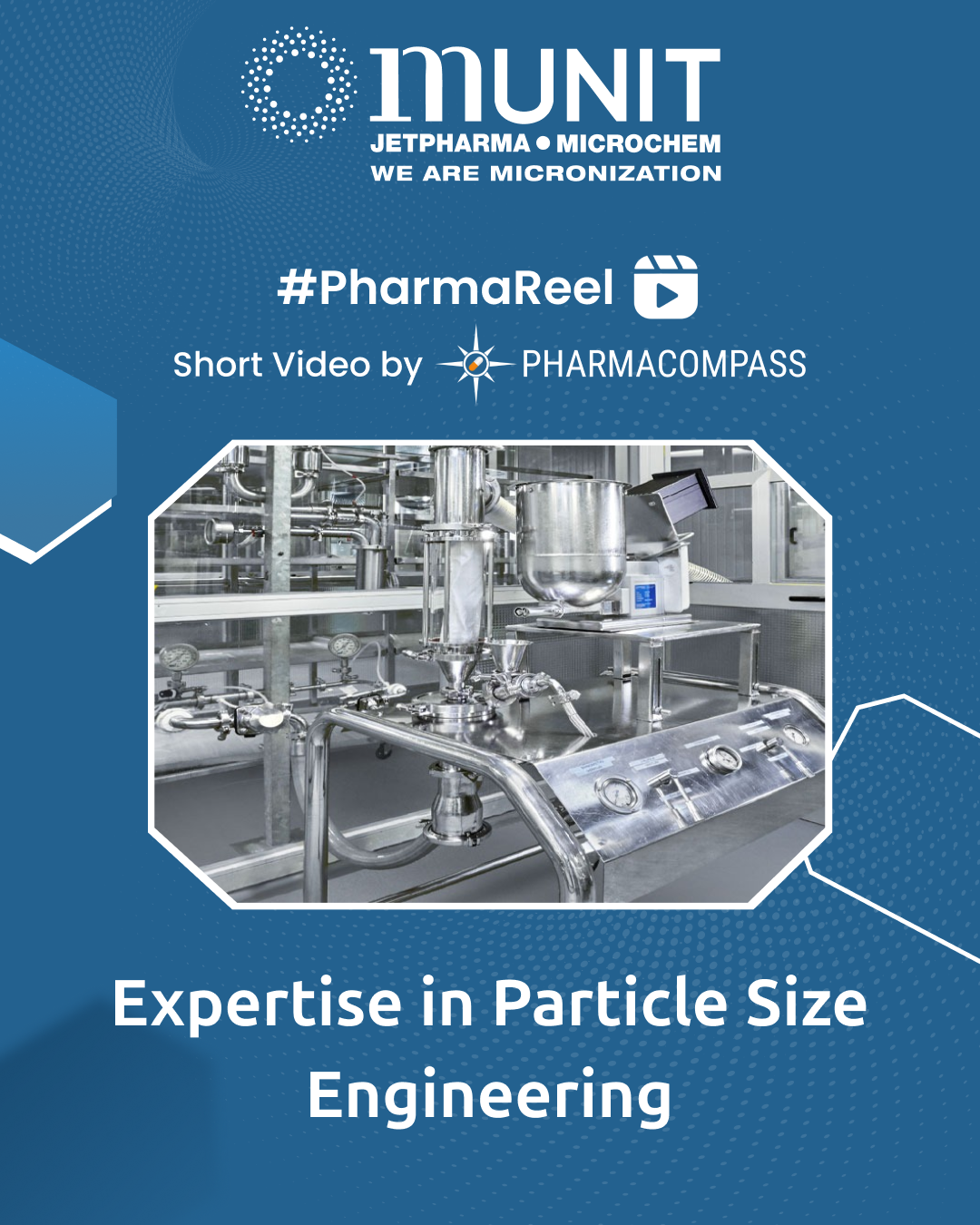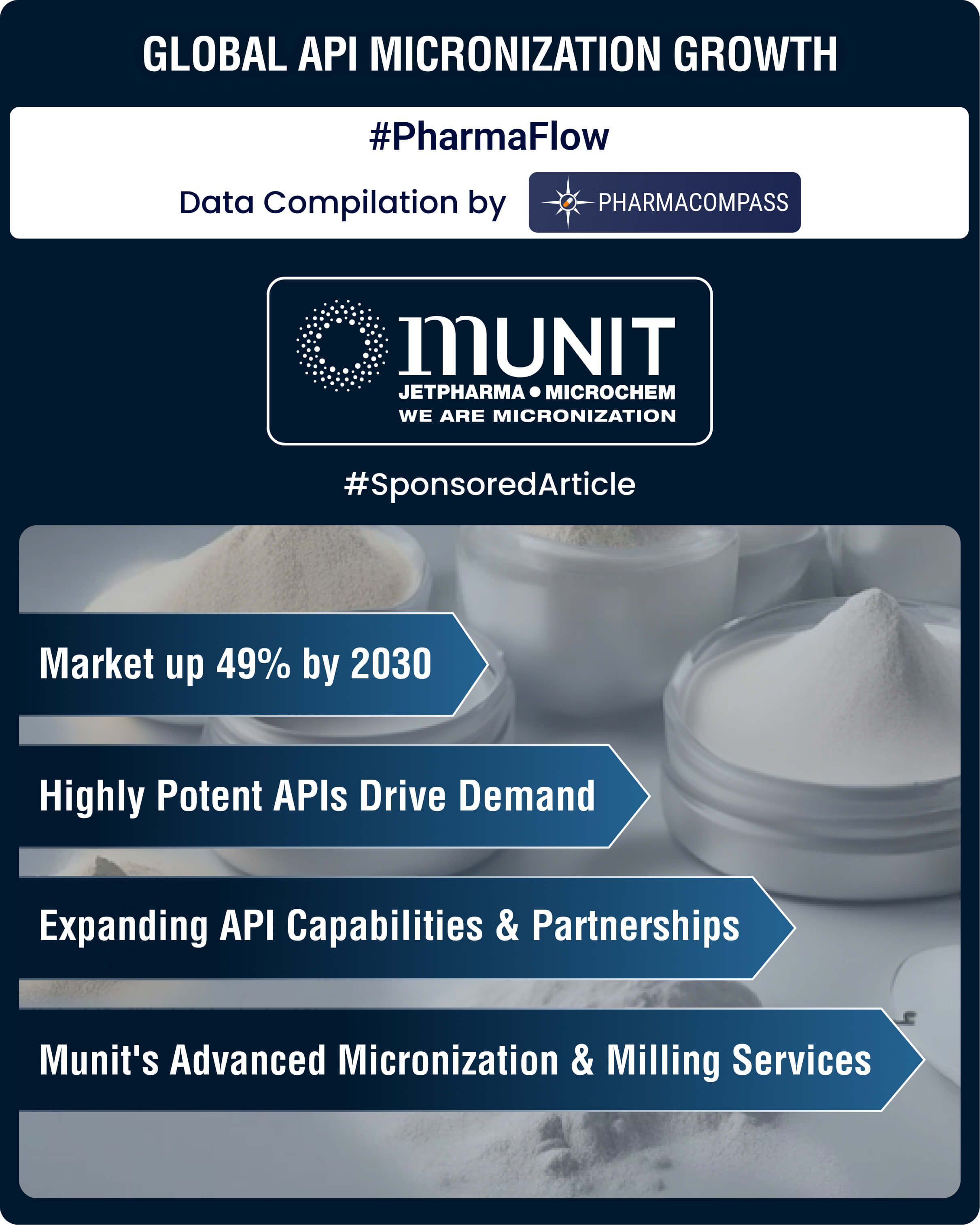
By PharmaCompass
2025-09-10
Impressions: 8189
Precise particle size control has become the cornerstone of modern pharmaceutical manufacturing. With highly potent active pharmaceutical ingredients (HPAPIs) and complex formulations driving unprecedented demand, micronization technology is no longer optional — it's critical.
The market reflects this urgency. The global API micronization market will jump from US$ 2.47 billion in 2024 to US$ 3.68 billion by 2030 — a 49 percent surge driven by a robust 6.84 percent CAGR.
What's powering this growth? Strategic innovation by industry leaders. Companies like Munit SA, Lonza, Catalent, Veranova, EUROAPI, AGC Pharma Chemicals, Hovione and Coral Drugs aren't just participating — they're defining the future of pharmaceutical particle engineering.
The Micronization Landscape: How leading companies are advancing pharmaceutical particle engineering
The API micronization space is being shaped by companies with specialized expertise. Munit’s proprietary fluid jet milling technology brings particle sizes down to the 1-micron level — critical for inhalation therapies. In addition, this technology enables precise control over particle size distribution without mechanical impact, making it ideal for heat-sensitive and high-potency APIs. With decades of hands-on experience, Munit ensures batch-to-batch consistency, scalability from R&D to commercial volumes, and full compliance with GMP standards.
Munit offers high-containment isolators — including glove boxes for R&D and half-suit isolators for larger batches — with industry-leading containment levels, limiting airborne drug exposure to as low as 0.025 micrograms per cubic meter. This makes it particularly well-suited for handling highly potent or sensitive compounds, exceeding the capabilities of other commercial-scale players like Catalent, who typically achieve containment levels of 0.05 micrograms per cubic meter or higher.
EUROAPI has taken a broad particle engineering approach, offering both micronization and spray drying across multiple dosage routes — oral, inhaled, and parenteral. AGC Pharma Chemical leverages spray drying and amorphous solid dispersion technologies across small molecules, peptides, ADCs, and oligonucleotides, exemplifying the evolving intersection of particle engineering and modern drug delivery innovation. Coral Drugs delivers cutting-edge technology and customization capabilities that tailor particle sizes to specific client requirements across tablets, injectables, and topicals.
This dynamic competitive landscape continues to evolve as companies expand capabilities and form strategic partnerships. This year, Dec Group announced the launch of their cutting-edge Micronization Suite, now operational in Brick, New Jersey, while Lonza joined the Centre for Continuous Manufacturing and Advanced Crystallisation, an international research hub, to develop innovative continuous processing and crystallization solutions.
Selecting the right micronization partner: Key success factors
In a pharmaceutical landscape increasingly defined by complexity, precision, and speed-to-market, the choice of a micronization partner can significantly influence a drug’s success. Among the players in this space, Munit SA has emerged as a trusted and strategic ally for pharmaceutical companies worldwide. But what exactly sets Munit apart in the micronization market?
To begin with, Munit SA brings over 60 years of experience in particle size engineering. This legacy is not just a number; it reflects decades of accumulated knowledge, process refinement, and a deep understanding of how particle size impacts drug performance. In an industry where even minor deviations can compromise efficacy or safety, this level of experience is invaluable. It has delivered over 500 successful micronization projects to more than 150 customers globally.
At its core, Munit SA is laser-focused on micronization and milling — not as ancillary services, but as its primary mission. Their facilities are designed for processing high-potency APIs, cytotoxic and cytostatic compounds, non-beta-lactam antibiotics, steroids, and controlled substances under stringent containment protocols. The company also handles inhalation products, peptides, biological drugs, generics, and R&D compounds.
Whether it's micronization for ophthalmic formulations, transdermal or oral products, Munit offers a tailored approach. It stands as a world-leading provider of micronization services in inhalation powders with particle sizes of 1-5 microns and specialized oncology applications for small molecules.
In an increasingly complex global landscape, Munit SA addresses supply chain challenges through its dual-site operational model, with facilities in Switzerland (Jetpharma SA) and Italy (Microchem S.r.l). This strategic setup mitigates risks from regulatory changes, geopolitical tensions, or environmental disruptions, ensuring continuous production and delivery of critical APIs. This resilience makes Munit a trusted partner for companies prioritizing business continuity.
Why pharmaceutical companies choose Munit for advanced micronization and milling
Munit’s proprietary MC Jet Mill is a testament to its engineering excellence. For heat-sensitive APIs, Munit’s cryogenic micronization process uses liquid nitrogen to cool materials, preventing thermal degradation and preserving the integrity of delicate molecules. This is particularly valuable for biologics and APIs with low melting points, where stability is paramount. Additionally, Munit’s under containment micronization employs advanced systems to safely handle HPAPIs, protecting both operators and the environment while meeting stringent regulatory standards.
Their co-micronization service, which processes APIs alongside excipients, further enhances formulation stability and solubility, offering innovative solutions for complex drug profiles. These capabilities, executed under Good Manufacturing Practices (GMP), make Munit a reliable choice for pharmaceutical companies seeking precision and quality.
While micronization is Munit’s flagship, it offers milling services through an array of technologies, each suited to specific needs. The Pin Mill uses a grinding chamber and particle size reduction is achieved due impact against a high-speed pin rotor, producing sizes from 50 to 150 microns. It’s particularly effective for APIs needing improved flow for tableting, offering precise size control that ensures uniformity. The Quadro Co-Mill excels at soft de-lumping and homogenization, using a conical sieve and impeller to gently process powders without altering primary particle sizes. For tougher materials, the HammerMill C-10 employs hammer bars on a rotor to crush particles.
State-of-the-Art Particle Engineering: Munit's strategic innovation push delivers next-gen solutions
Munit’s leadership in micronization is underpinned by a deliberate and sustained investment in innovation — aimed at building the next generation of particle size engineering.
In response to client challenges with condensation and product degradation, Munit developed a proprietary conditioning system that precisely controls humidity and temperature. Engineered with ergonomic design and fluid dynamics principles, their machine represents a qualitative leap in conditioning. Munit's new AIFA-approved Building C transforms the Italian hub's capacity. Equipped for high potent, toxic, cytotoxic, and cytostatic compounds, alongside hormones, it features cutting-edge safety systems and integrated technologies, enabling broader API processing with precision and compliance.
Munit has merged quality assurance and regulatory affairs into one strategic unit, streamlining workflows and enhancing client responsiveness during critical validation phases. This delivers tailored regulatory support and accelerates time-to-market. These initiatives position Munit at the forefront of particle size engineering, where state-of-the-art innovation, regulatory excellence, and client-centric design converge to set new industry standards.
Our view
The API micronization market is projected to grow 49 percent to US$ 3.68 billion by 2030. In this evolving landscape, companies that combine deep technical expertise with operational resilience are positioned to capture the greatest value. Munit SA exemplifies this winning formula.
The PharmaCompass Newsletter – Sign Up, Stay Ahead
Feedback, help us to improve. Click here
Image Credit : Global API Micronization Growth by PharmaCompass license under CC BY 2.0
“ The article is based on the information available in public and which the author believes to be true. The author is not disseminating any information, which the author believes or knows, is confidential or in conflict with the privacy of any person. The views expressed or information supplied through this article is mere opinion and observation of the author. The author does not intend to defame, insult or, cause loss or damage to anyone, in any manner, through this article.”


